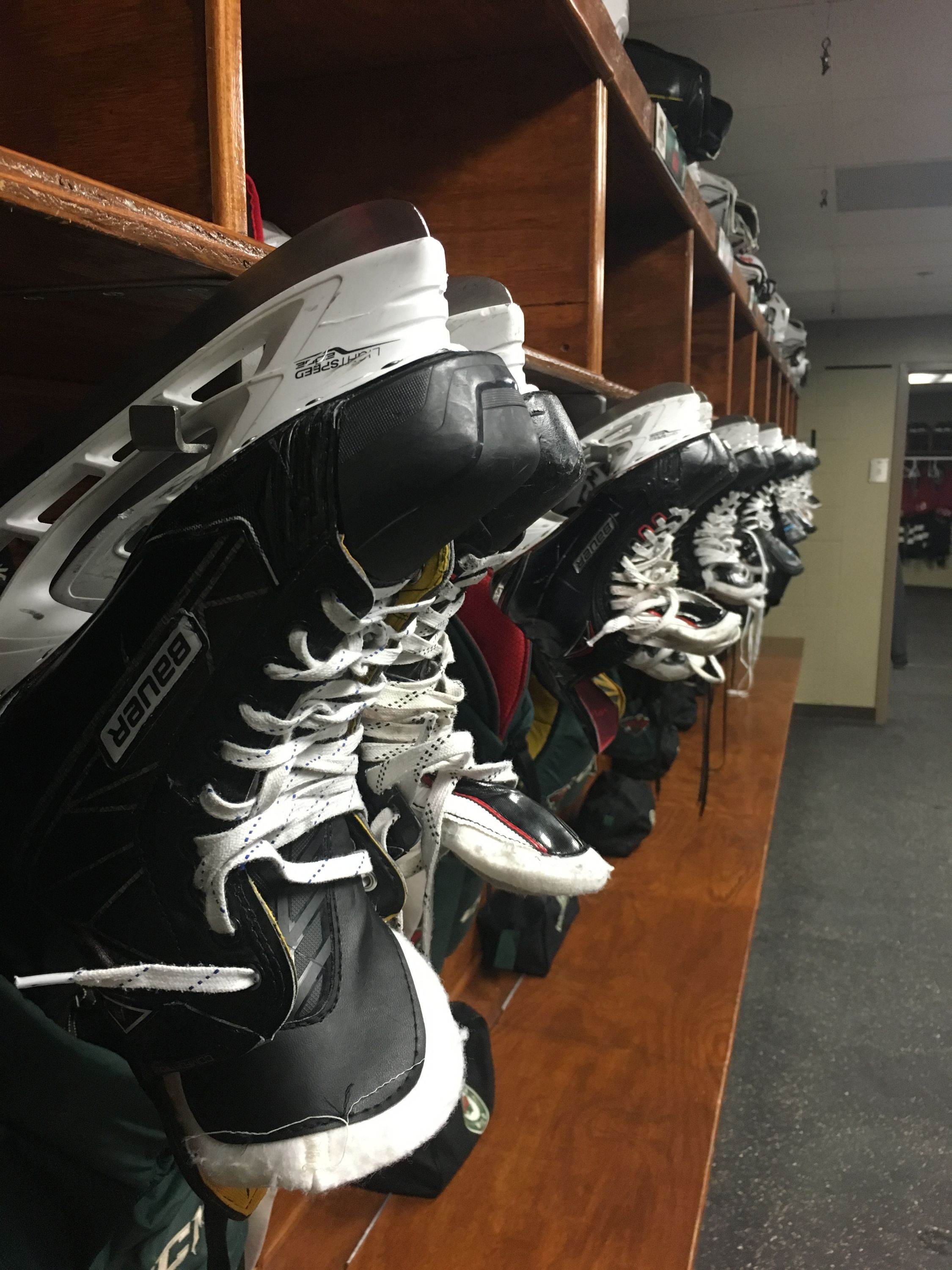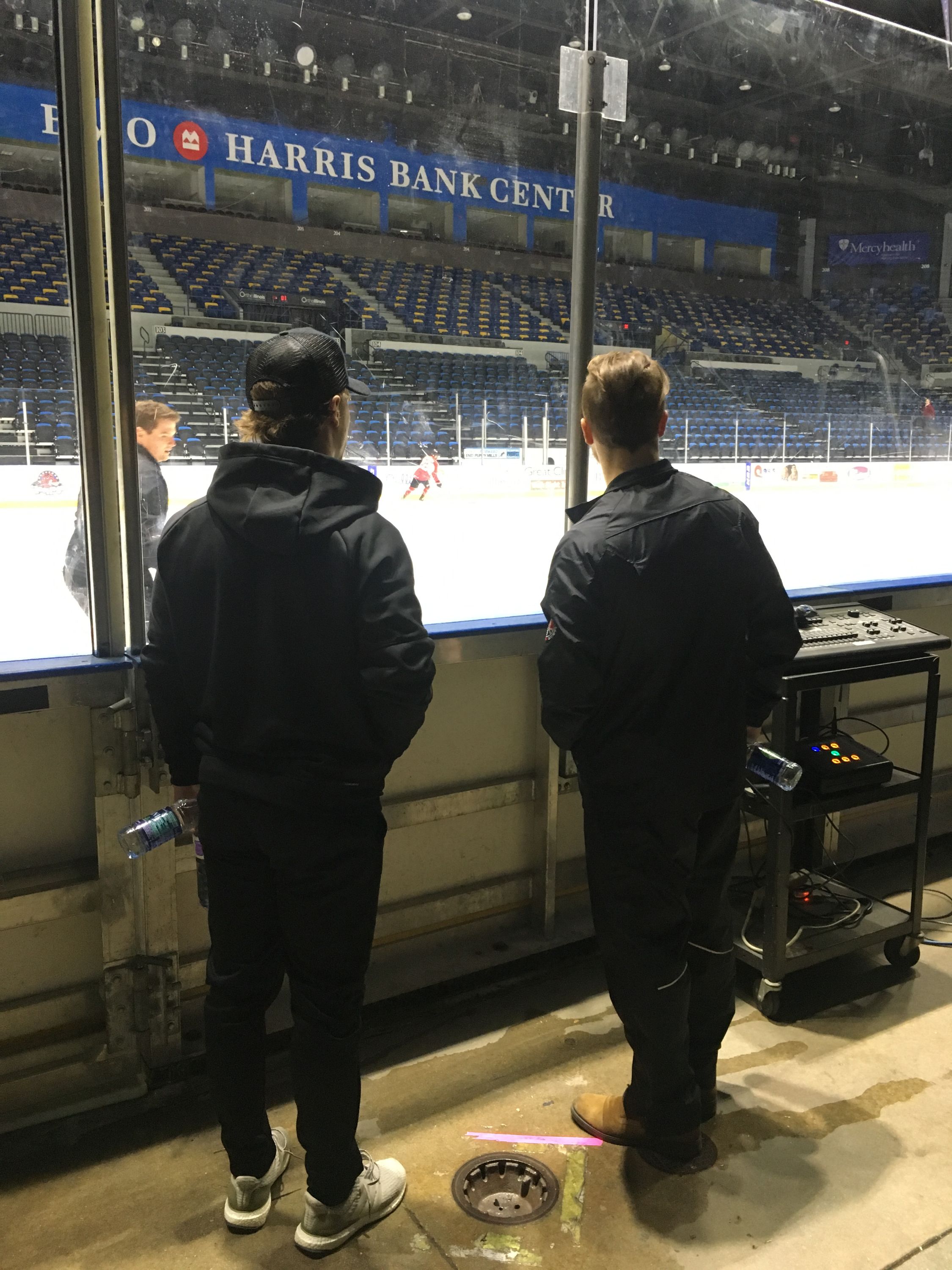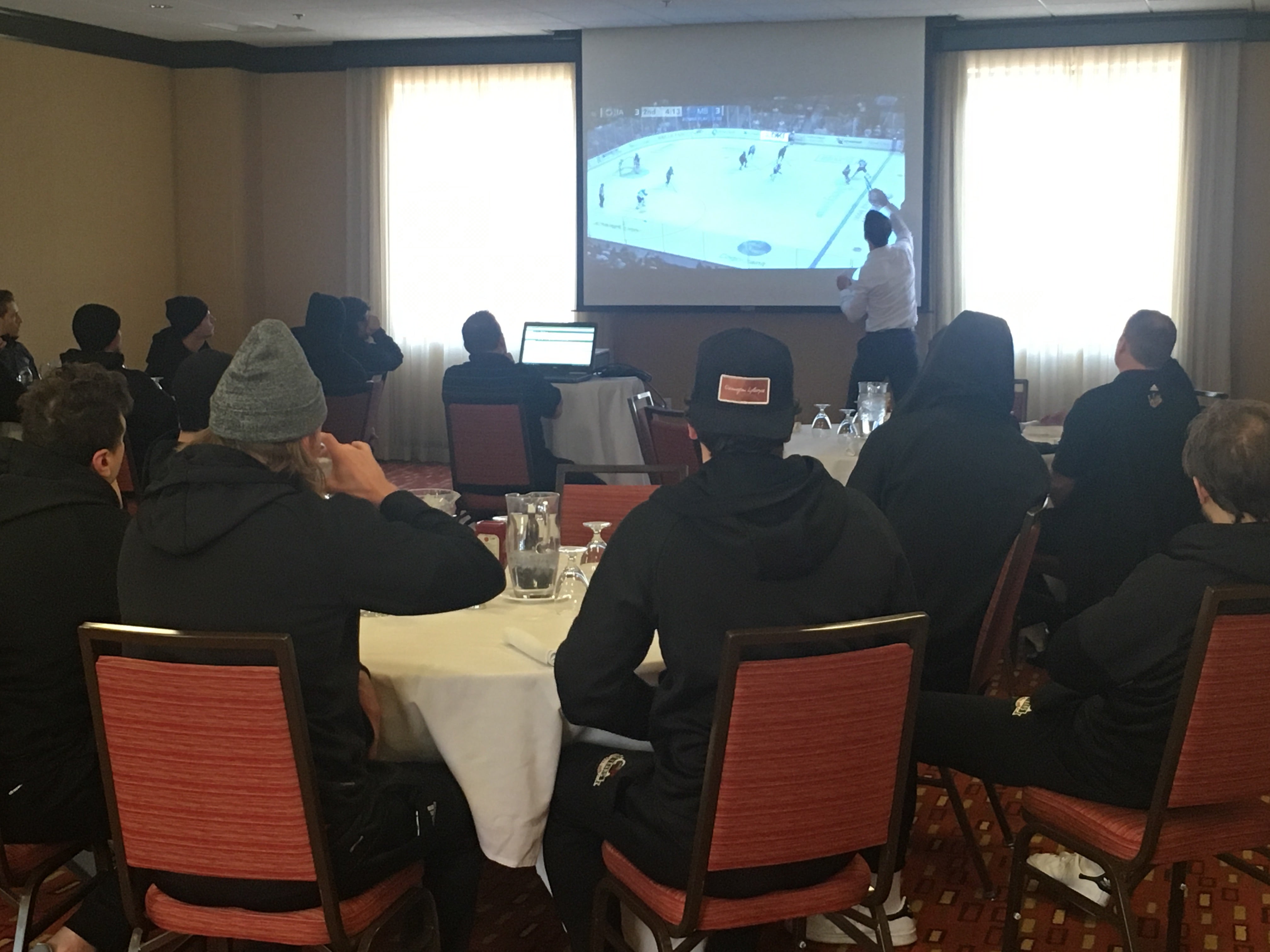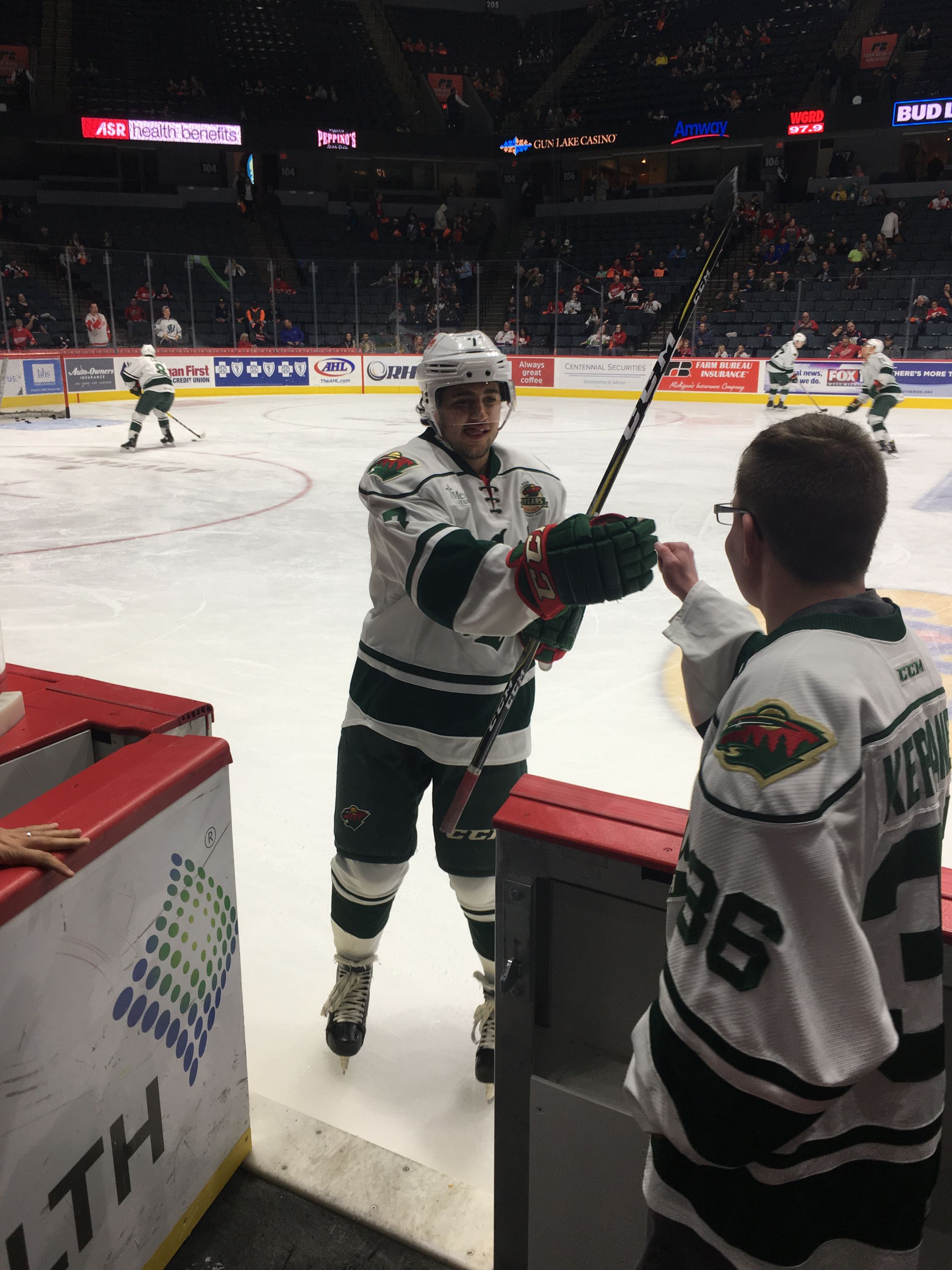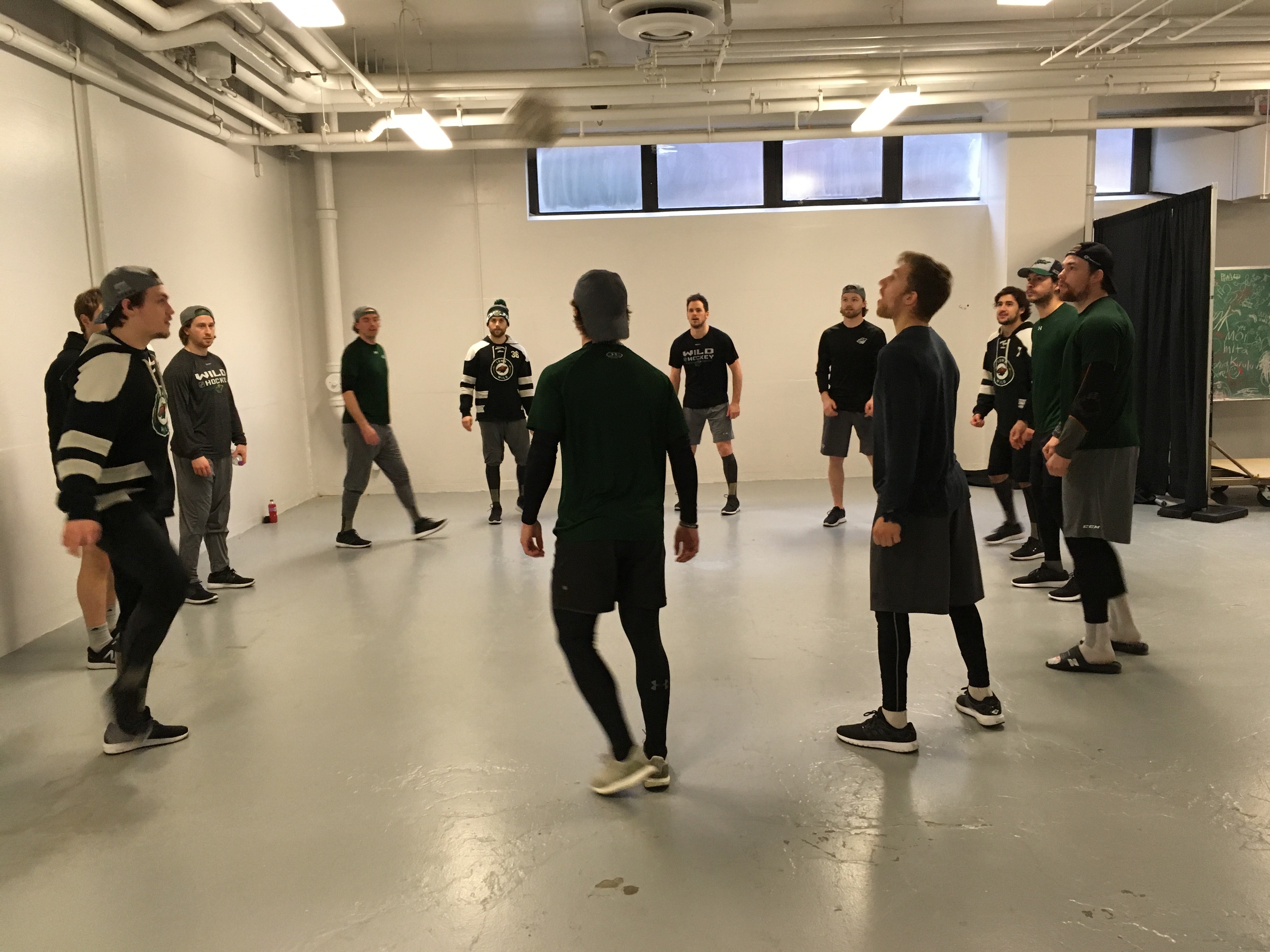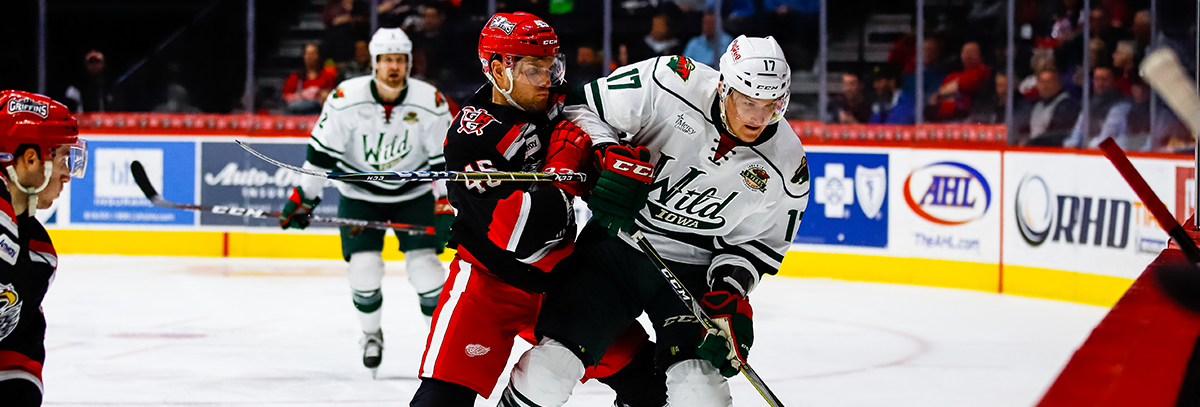
THE GRIND: AN INSIDE LOOK AT LIFE ON THE ROAD WITH IOWA WILD
May 1, 2018By Jacob Born (@Jacob_Born)
4,959 miles. Seven different cities, including some twice, over the course of 25 days.
The month of March saw Iowa Wild face its most brutal road stretch of the season. From February 24 through March 18, Iowa played 10 of its 11 games on the road; a six game road trip spanning from Canada to Texas, back home for a single game, then another four on the road, the final two being a part of a 3-in-3 series.
Trips like the Wild’s is not special to just Iowa; every team in the American Hockey League has these long stretches on the road, often taking buses during the midnight hours for another game the next day.
Following the team’s 4-3 victory on home ice against Manitoba on March 11, the team held a quick practice before road tripping to Rockford for a game the next day. This is a first-hand look at what life is like on the road for a team in the heat of the playoff race in its most brutal travel stretch of the season, and what the team’s final road trip of the season looks like one month later.
Monday, March 12 – Practice and Traveling to Rockford
Thanks to the victory the day before, the locker room is loose ahead of what will be about 20 minutes out on the ice. Head Coach Derek Lalonde wants his team to get a quick workout on the ice, get a little sweat, but not overwork the team ahead of the four-hour bus ride. Each player brings a travel bag, which scatters the lounge and dressing areas of the locker room.
There is a new face in the locker room as well. Forward Gerry Fitzgerald signed an Amateur Tryout Agreement (ATO) with the team and participated in his first practice with the team. He officially signed his ATO on the bench, then hopped out on the ice before practice begins.
While the team is out on the ice, the rest of the staff gets ready for the road trip. Equipment Manager Mike “Tuna” Lefczik and Strength and Conditioning Coach/Assistant Equipment Manager Jason Aldrich load up a trailer, which is attached to the team’s 30-person sleeper bus. First goes in the training room and extra supplies Lefczik or Aldrich may need during the trip. Following practice, each player’s gear and laundry is loaded up onto carts and taken to the loading bay.
Veterans head directly on to the bus, picking out the prime spots for the four-hour road trip. Meanwhile, the rookies help load up the trailer with the training staff, pushing the bags and other miscellaneous items into the trailer. Less than an hour after practice has ended, the entire team is on the bus, pulling away from Wells Fargo Arena.
The bus stops a few minutes away at a local Hy-Vee and players unload to peruse the options. Some grab sandwiches, others sushi, others burritos, others a salad. But the team only has 25 minutes to eat. A quick meal and then it’s back on the bus to start the trek toward Rockford.
Once on the road, the boys settle into their normal road trip routines. Players such as Justin Kloos, Ryan Murphy and others play cards in the back of the bus. Rookies sit up front, most playing games on their phones. Carson Soucy works his way to the front of the bus, fiddling with remotes for a few minutes before finally getting “The A-Team” to play over the various TVs. And at the very front of the bus are the coaches, laptops open, studying game film from the team’s 4-3 victory against Manitoba or studying up on Rockford or Grand Rapids, the Wild’s next two opponents.
Lalonde is particularly active, albeit on his phone rather than on a computer. He’s talking with the AHL about a potential suspension for Wild goaltender Niklas Svedberg. In the club’s game against Manitoba, Svedberg cross-checked Moose forward Patrice Cormier in the face after a couple of slashes by the latter on the former. Cormier fell to the ice, clutching his face and requiring a towel. Svedberg was given a match penalty for the crosscheck, while Cormier received a two-minute penalty for roughing. Heading to the penalty box, Cormier smiled and winked at the Wild bench, drawing the ire of the entire Wild contingent.
“One game,” Lalonde announces to the front of the bus. “I think that’s fair.”
So Svedberg will sit out the team’s game against Rockford the next night. But now, the team must find another goaltender to back up Steve Michalek.
Director of Broadcasting and Team Services Joe O’Donnell is already on the phone with the Rapid City Rush, Iowa’s ECHL affiliate. Anticipating a potential suspension the night before, O’Donnell booked flights for goaltender Adam Vay and forward Pavel Jenys to meet the team in Rockford.
The four-hour bus trip passes quickly, as players and coaches enjoy the down time and an easy ride. At around 4:00 p.m., the bus pulls up to the hotel and players unload to check into their hotel rooms.
While the players head to their rooms, the coaching and support staff stays on the bus. Another 20-minute bus ride and the staff arrive at BMO Harris Bank Center. All that equipment that was loaded up in Iowa must now come off.
Lefczik and Aldrich have a routine. Bags get placed on a stall in the road locker room and all the equipment comes out. The setup for each locker depends on the facility for the day. All the pads are laid out for easy access, warm-up laundry is placed on hooks and each player gets a set of flip-flops and shoes. All the medical supplies go into the trainer’s room and extra equipment supplies remain in the hallway.
“By now, we could do it in our sleep almost,” Aldrich said. “It’s still time consuming, but it’s pretty routine. We have a good system between the two of us, so we manage to get things done in a timely fashion.”
“It’s almost easier on the road because you only worry about your team, you don’t have to help set up the other team’s stuff,” Lefczik added. “But he and I are like linemates now. I know what he’s doing and he knows what I’m doing. We don’t even need to talk to know what’s going on.”
All in all, the process of setting up the locker room takes approximately two hours and eventually the coaches and support staff return to the hotel, while Aldrich and Lefczik remain to finish up personal duties.
There’s not a team dinner this night, so players and coaches scatter for sustenance at varying restaurants. A few players and coaches choose The Tavern, which is within walking distance of the hotel. Having a meal serves as a quality bonding experience, especially for players such as Vay and Jenys, who joined the team at the hotel earlier in the day.
As the evening goes on, the team sporadically retreats to the hotel. With a morning skate ahead of the game tomorrow, no one stays out too late, needing a full night’s sleep.
Tuesday, March 13 – Iowa vs. Rockford IceHogs at BMO Harris Bank Center
Normally, the road team has a later morning skate than the home team, which means Iowa won’t hit the ice at BMO Bank Harris Center until 11:15 a.m., giving the team plenty of time to wake up, eat breakfast and attend a meeting before the morning skate. With the travel day the day before, only scratches have mandatory ice time. For everyone else, it’s an optional skate.
Eight players hop on the bus following the team meeting to go to the arena. Both Vay and Svedberg hit the ice, as Svedberg will be serving his one-game suspension at Rockford, and Vay will be backing up Michalek. Kurtis Gabriel, who’s been bothered by a hip injury, will be scratched again, but uses the ice time to work his way back to 100-percent health.
Also taking the ice is Fitzgerald. The coaching staff told him before the morning skate he’d be making his AHL debut later that night.
“I’m super excited,” Fitzgerald said. “I’m mainly excited about everything. It’s a great experience. I’m trying to create a spark and help the boys win. It’s a great group of guys here and I’m just here for the ride.”
Goaltenders work on angles and position from points both far away and close in, while skaters complete drills focusing on skate speed and passing. After a quick sweat, every player is off the ice by noon.
The bus back to the rink leaves for the game at 4:30 p.m., so from the end of the skate until then, the players are once again free to participate in their own pre-game routines. Lunch is provided at the Thunder Bay Grille next to the hotel, which most players partake in. Then come the afternoon naps or extra film sessions. By the time 4:30 rolls around, about half the team is on the bus to the rink. The other half has already headed down early to BMO Harris Bank Arena to prepare for the night’s matchup against Rockford.
The game was a back-and-forth affair, as Wild forward Kyle Rau scored just two minutes into the contest, kicking off the longest point streak of his career, eventually reaching eight games. Rockford’s Lance Bouma evened the score up at 11:17 in the first period, before Wild defenseman Brennan Menell gave the visitors the lead at 17:50 in the opening frame.
Instead of sitting with the other scratches, Gabriel joins O’Donnell in the radio booth for the game, presenting color commentary between O’Donnell’s play-by-play breakdown of the contest. This isn’t the first time Gabriel has been in the booth; when he was recovering from a nasty laceration on his wrist that cost him more than three months of the season, he joined O’Donnell during some home games.
On this night, Gabriel does a great job of providing insight on what the game is like from a player’s perspective. He takes note of a play by Gerry Mayhew driving to the net when trying to create a scoring chance. He also speaks his mind when Wild forward Landon Ferraro gets blindsided by a Rockford player late in the second period.
Rockford’s Luke Johnson made a line change and as he skated away from the bench, he made contact with Ferraro, who was skating up the ice. Johnson’s shoulder hit Ferraro squarely in the head, causing him to crumble to the ice. Play stopped and Ferraro needed help off the ice and to Iowa’s locker room.
Ferraro returned for the third period as Iowa held the 2-1 lead. IceHogs forward Henrik Samuelsson tied the game at 14:21 of the third period, sending the game into overtime. In the extra frame, Rockford’s Andreas Martinsen deflected a shot from Cody Franson past Michalek, giving the hometown team the 3-2 overtime victory.
As the Wild filed into the dressing room following the game, there wasn’t much time to reflect on the loss. The team was scheduled to play Grand Rapids the following night in Michigan.
Immediately following the game, Aldrich and Lefczik get to work, breaking down the locker room to load it onto the trailer. Coaches put all of their equipment and laptops into bags to be brought on the bus.
Once the players have gotten undressed, there’s a quick post-game meal at the arena before everyone files onto the bus.
There is one player who does not join the team though. Vay, after serving as a backup to Michalek, is reassigned back to Rapid City. O’Donnell calls him an Uber, which picks him and his gear up at the arena. Vay spends the night in Rockford and hopped on a plane Wednesday morning to rejoin the Rush.
Due to the recent call-ups, the bus is jam-packed, so O’Donnell and goaltending coach Frederick Chabot do not ride on the bus. Instead, the extra bodies hop in a rental car, which leads the way to Grand Rapids. The bus and rental car pull away from BMO Harris Bank Center at 10:30 p.m., with a four-hour drive ahead.
Tuesday, March 13 into Wednesday, March 14
Mother Nature does the Wild no favors as the team makes the midnight trip to Michigan. Snow falls from the sky, ranging from flurries to decent accumulation.
The rental car arrives at the team hotel at 3:30 a.m., as the team loses an hour going from the Central time zone to the Eastern time zone. O’Donnell heads inside to check in and grab all the hotel keys. The bus arrives at 4:00 a.m. and players half-asleep pile off the bus and grab their room keys to go right back to bed.
“In the AHL, there’s some really tough travel,” Lalonde said. “This is a perfect example of it. It’s just a reality of the schedule.”
But much like when the team arrived in Rockford, the Wild’s locker room must be set up. So, at 4:00 a.m., a small group of the traveling contingent hops back on the bus and heads to Van Andel Arena just a few blocks away.
The visiting locker room, or rather rooms, is much different than the one the team left mere hours ago. The room is cut in two, save for an opening in the middle, giving the area the impression of an “H.” There are stalls along the long parts of the room, but in the middle, players are forced to get dressed on folding chairs. The room is cramped, especially when there are extra bodies along for the trip.
Not connected to the locker room is a dressing room for players to change into their team attire, along with the coaches’ room and the training room.
“These nights are tough,” Lefczik said. “This is one of the toughest stretches of the season. It throws your whole schedule off. But this is the grind of the season.”
Just like in Rockford, the whole process takes a couple of hours, meaning the support staff doesn’t get into their respective beds until around 6:00 a.m., just in time for the rest of Grand Rapids to start getting ready for their work day.
Wednesday, March 14 – Iowa vs. Grand Rapids at Van Andel Arena
The third day of the road trip begins with a team meeting at 11:30 in the hotel. Assistant Coach Brett McLean leads the penalty kill meeting with the whole team in attendance. He dissects the previous night’s video, pointing out what went wrong and what was successful. He follows it up with the meat of the presentation.
McLean has designed a new philosophy on the penalty kill to specifically target the Griffins. With four critical games in the next 11 days against Grand Rapids, it’s paramount to get points, especially with the two teams fighting for the same playoff spot. Special teams is key for both squads, so employing a new strategy on special teams could be the difference maker.
Following the meeting, the team has its traditional pre-game meal; pasta and chicken. But before everyone disperses, Lalonde addresses the team.
As part of his coaching philosophy, Lalonde breaks up the season into five-game segments. If the team obtains six of the 10 possible points of the segment, they win the segment. And if the team averages six of 10 points during the course of the season, it’s usually good enough to make the playoffs.
In this specific segment, the team went 2-1-2-0, earning exactly six of 10 points. He applauds the team puck possession and winning 50-50 battles, all data points collected by the team itself. He also lauds the team for their special teams play and is especially excited to see how the team implements the changes McLean was discussing just a few minutes before.
Once again, just like the previous day, the afternoon is spent for players to get ready for the night’s game, however they see fit. But unlike in Rockford, players can walk to the arena rather than taking the bus.
There's no downtime for O'Donnell and the coaching staff though. Minnesota Wild defenseman Jared Spurgeon suffered a partial tear in his hamstring against Colorado the night before, meaning the big club needs bodies. The team recalls forward Zack Mitchell and Murphy from Iowa to help replace the injured. O'Donnell needs to book them both flights as soon as possible.
Upon hearing of their recall, Mitchell and Murphy immediately go to a mall to buy a suit. Iowa's dress code for the trip is more relaxed than Minnesota's, and the two don't want to look out of place. By 4:00 p.m., with suits in hand, the pair is on their way back up to the NHL.
Sudden recalls is life in the AHL, but it doesn't make things easier for Lalonde and the rest of the support staff. With two veterans heading up to Minnesota, Iowa will be forced to play every person on the trip. There won't be any healthy scratches tonight.
Players sporadically arrive at Van Andel Arena until 5:00 p.m., when every player is in the room and start their pre-game routines. The clock moves methodically and eventually, for the second time in as many nights, the players exit the tunnel for warmups without much fanfare or support. Except for one family, who hit the road with the team, following them to every game on this trip.
The Bolander family, Trish and Eric, with son Matthew, have been season ticket holders for five years. Matthew has become close throughout the years with the team and for tonight’s matchup, he’ll watch the warmups from the bench. He gets fistbump after fistbump as the players hit the ice, and receives one when they head back down the tunnel again. He talks with forwards Cal O’Reilly and Sam Anas, and even receives a puck.
“This is the highlight of the trip,” Trish said. “The guys are so nice to him and he always enjoys it so much. The team makes him so happy.”
The seconds tick off the clock to zero, ending pregame, and the Zamboni comes out to scrape the ice. Iowa is ready for the second of a back-to-back. Unfortunately, things do not start out well at all.
Fourteen seconds into the game, Grand Rapids’ Ben Street scored to make it 1-0, then forward Matt Puempel doubled the Griffins’ lead at 2:36 in the first period. Down 2-0 just more than an eighth of the way into the opening frame, on the second leg of a back-to-back, to the team you’re just .001 percentage points ahead is pretty much a worst-case scenario for the Wild. Unfortunately, it gets even worse for the visitors.
Just more than two minutes after Grand Rapids’ second goal, Wild forward Ryan White body-checked Griffins defenseman Robbie Russo along the right boards in the Iowa defensive zone. Russo stayed down on the ice as White tussled with Grand Rapids players looking for justice. The referees conferred and gave White a five-minute major for boarding and a game misconduct. White also received a two-game suspension for the play.
Later in the first period, Wild defenseman Matt Caito laid a big hit at the red line, but landed awkwardly on his ankle. He needed help getting to the bench by the linesman and he failed to return to the game.
When the horn sounded for the end of the first period, Iowa trailed 2-0 on the scoreboard and lost two bodies for the game, shortening the bench to just 16 skaters.
Iowa found its way onto the scoreboard when Dante Salituro recorded his first goal in an Iowa Wild sweater in the second period. After a shot from the point from defenseman Viktor Loov, Salituro picked up the rebound and, while falling to the ice, slid it past Griffins goaltender Tom McCollum. But it was the only score of the period and Iowa headed into the final frame trailing 2-1.
In the third period, Iowa solidified arguably its biggest victory in team history.
The team scored three goals in less than two minutes of play, turning a 2-1 deficit into a 4-2 lead and stunning the home team.
Mayhew opened the scoring with a rebound goal of his own, which was followed by a snipe from Salituro to take the lead. Salituro received a drop pass from Rau and launched the puck over McCollum’s glove, sending the Iowa bench into a frenzy with the team’s first lead of the game.
The Wild added the insurance goal just 25 seconds after Salituro’s second goal of the game, as a shot from Anas bounced off the glass behind the net back in front of the crease before deflecting off Mayhew and across the goal line.
After allowing two goals in the first 2:36, Svedberg stopped every other Griffins shot, securing the win and giving Iowa its first victory at Van Andel Arena since January of 2016.
“Sometimes you’re up against it, you have this us vs. the world mentality,” Lalonde said. “Our guys have done a good job of doing that. We’ve gained points in seven of our last eight road games. We’ve battled, we’ve grinded, we’ve competed and the results have been in our favor.”
Understandably, the locker room was lively following a huge victory, both in terms of morale and in the standings. With an off day ahead, doubled with the beginning of March Madness, the players and coaching staff went out in downtown Grand Rapids to celebrate the win.
“This was one of the wins of the year for us,” O’Reilly said. “Character win. Especially the way we started, it could have been rough, but we pulled it out.”
A Styx and Eagles concert in the coming days forced the Wild to move practice to the Griffins practice facility following the day off, which means Aldrich and Lefczik have to pack up all the gear and load it onto the trailer for transportation to the secondary venue. But with the win, the work is less tedious or burdening than it was just 24 hours ago.
One Month Later – Saturday, April 14 - Iowa vs. Milwaukee Admirals at UW-Milwaukee Panther Arena
A lot can change in a month in the AHL and for the Iowa Wild, the change wasn’t ideal.
The team fell from third in the division to sixth, missing out on a playoff spot once again. Players such as Soucy, Murphy, Nick Seeler and Zack Mitchell were called up to Minnesota, resulting in Iowa filling out its roster with ATO contracts.
In the team’s season finale, Iowa and Milwaukee compete in the final game of a home-and-home series. After the Wild’s 3-0 win at home against the Admirals, the team scurries about the locker room, each player gathering their respective travel bags and a quick bite to eat before boarding the team bus at 10:30 at night. Ahead of them is a six-hour trip to Milwaukee in inclement weather, as Winter Storm Xanto makes its way through the upper Midwest.
At the forefront of everyone’s mind is the Humboldt Broncos, the Canadian junior hockey team that saw an unspeakable tragedy unfold on April 6. As the team traveled in Saskatchewan to its playoff game, its bus was hit by a semi-truck. Sixteen members aboard the bus perished, while survivors received significant injuries.
In the wake of the tragedy, hockey teams all across North America did what they could to help the Humboldt community heal. Iowa raised more than $5,000 for the team in a silent auction and donation drive at the team’s April 10 game.
With the inclement weather, the team carefully and methodically makes its way to Wisconsin, getting into Milwaukee just after 4:00 a.m. Thankfully, due to a road game in Milwaukee just six days earlier, Aldrich and Lefczik don’t have to unload much gear, as they left as much as they could earlier in the week.
For the final time in the 2017-18 season, the Wild and Admirals conduct their pre-game rituals at the Admirals’ facility. Players participate in two-touch, stretch or go over last minute game prep. The teams take the ice for warm-ups at 6:45, each team featuring a goalie on a PTO. In Iowa’s case, both goalies are on PTOs, as Minnesota wants Svedberg as healthy as possible for the NHL playoffs, so he’s given the night off.
In a game between two teams both eliminated from playoff contention, the two teams battle each other with a feistiness that’s expected in the rivalry. The scoreless contest is broken by a shorthanded, unassisted goal by Brandon Bollig for Milwaukee. But the Wild answered with defenseman Gustav Bouramman’s first career AHL goal, just seconds after the Milwaukee faithful were upset on a perceived missed high-sticking call. Bouramman’s goal sent the crowd into hysterics.
Defenseman Alex Grant gave Iowa the lead with a buzzer-beater to end the second period and a score by Mayhew early in the third firmly put Iowa in the driver’s seat for the rest of the game. Milwaukee started to claw back, but Grant notched his second of the contest to ice the win.
Grant’s two goals gave him the single-season record for goals by a defenseman in Iowa Wild history and the win gave the team the most points in a single season ever. The game closed the book on the 2017-18 season, one which saw the team miss out on the playoffs once again, but also one where the team broke more than 40 individual or team records, while also tying 15 more.
Immediately following the game, the pop-punk band All Time Low plays a concert, but the Wild doesn’t stick around. The team gets a local favorite, Ian’s Pizza, for the ride home and by 9:30, the team embarks on the trip home to Iowa. Winter Storm Xando has shifted from snow to freezing rain, meaning another careful trip through the night.
The team returns to Wells Fargo Arena around 4:00 a.m. and players crawl off the bus and into their respective cars to finish the trek home to their apartments. That bus ride home is the last time this installment of the Iowa Wild will ever be together.
After a day off on Sunday, Monday serves as the team’s exit interview day, where players say their final goodbyes to teammates and staff members, but not everyone is in attendance. Minnesota recalls reinforcements for its playoff run and the “Black Aces” are already on their way up to the Twin Cities.
It’s a bittersweet day. There will never be another season like the 2017-18 season and the fact it ended abruptly doesn’t help ease those feelings. Following the Milwaukee game, players start going back to their respective corners of the world, whether that is California, Minnesota, Ontario or even Sweden.
The road is where teams come together, building camaraderie and a locker room culture that will permeate throughout the season. Every hockey player experiences life on the road, creating a bond from juniors through the pro ranks. It’s a grind, but ask every player and they’ll tell you it’s worth it.
Players one by one say goodbye to the coaching staff and stock up on supplies for the offseason, grabbing extra rolls of tape, laces and even sticks. They get their offseason workout plans and then head out the door one last time.
Then they hit the road once again, heading to wherever they call home, before next season comes calling.

